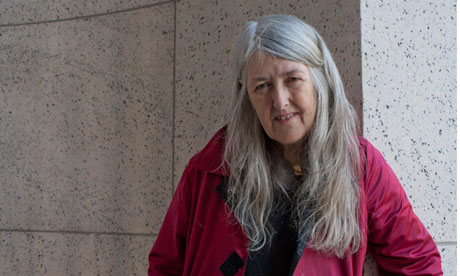
Mary Beard's hair gets people going. Even her admirers refer to her "grey hair, wild as a witch" (Cristina Odone in the Telegraph). Internet bullies tell her to "get [her] hair fixed — cut, dyed and styled". Samantha Brick, in the Daily Mail last year, wrote of the "tragedy" of Beard's silver locks – apparently her producers should have tamed them before letting them loose on the airwaves. According to some rather vocal people, it simply isn't OK to have long grey hair. And not just if you're Mary Beard.
This winter's Marks & Spencer TV ad featured Yasmina Rossi, a 56-year-old model. Scathing online comments mentioned her "mad person's long white hair" and, again, compared her to a witch. (Others, to be fair, commented on her extraordinary attractiveness.) When Kate Moss, in 2010, appeared with a few white strands at her temples certain sections of the press put it down to her unwholesome lifestyle. Her agency's PR office offered different, contradictory explanations: highly fashionable "greylights", toner left on too long, over-use of dry shampoo ... anything but natural loss of pigment.
Hair dye ads relentlessly promise to save us from the hideousness of going grey. But why should it be so awful? And why are women with long, naturally grey hair such targets of hateful criticism?
The word "witch" comes up remarkably often in relation to this particular hairstyle (although grey-haired supermodel Kristen McMenamy is classed as a "good witch" for some reason). This probably shouldn't be surprising given that fairy books are full of wicked old women with unkempt locks straggling out from under their pointy hats. Perhaps the question is more why society should so often choose to portray older women in this way. Is the idea somehow that, once women have ceased to be objects of desire, they turn against the world and spend the rest of their days wishing evil on a populace that bypasses them? (Snow White's stepmother only freaks out when she's told she isn't the prettiest any more.) If so, what place does this logic have in a world where women can supposedly be valued for more than just their beauty – maybe becoming Cambridge professors of classics, for example?
The Oxford English Dictionary definition of a witch includes two opposing meanings. On the one hand you have "an ugly or unpleasant old woman", but then again you have "a girl or woman who is bewitchingly attractive". Whichever way round you take it, it has everything to do with fanciability. Is she or isn't she? Or could she even be both?
It's curious that, in the assault on Beard's supposed unsexiness, there has been so much reference to genitalia and sexual acts. One of Beard's more excellent features is that she speaks so frankly about sex – as you would expect from any serious classicist. But she certainly doesn't speak about her own sex life in public. Still, this clearly doesn't stop certain people from speculating about it, building a fantasy using the little they know as a starting point. And one obvious starting point is the hair. Long hair is typically equated with unrestrained sexuality (think pre-Raphaelite muses – or 99% of glamour models), while grey hair is associated with being past it.
If you are bad at processing complex information, this combination will fry your brain. (What, a woman past breeding age still up for it? As if sex was all about procreation. As Beard may tell you, even the Romans used contraceptives.) And perhaps in this frazzled state you might lash out at the person who has made you confront this enigma – the woman who really shouldn't turn you on, but who somehow causes you to have filthy thoughts. (Sound anything like your mother?)
This uncanny brew in a woman is clearly a bit much for some people – and, in the past, women who embodied this "too muchness" were very often accused of witchery. While Beard may have imagined that her "big, tombstone teeth" and "uncompromising double chin" (her words this time) might keep the attention off herself and on her chosen subject matter, it seems that intelligent women with unconventional dentistry and flowing grey manes are greater catalysts for sexual fantasies than many of us might have predicted.

